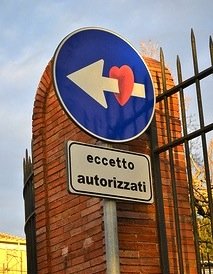 What happens when you lose your way? For some, “the way” may feel like a pair of glasses without which they cannot see. For others, it is more like a raft that can be left at shore once they have crossed over to the other side of the river, while new “ways” await them as they journey onwards.
What happens when you lose your way? For some, “the way” may feel like a pair of glasses without which they cannot see. For others, it is more like a raft that can be left at shore once they have crossed over to the other side of the river, while new “ways” await them as they journey onwards.
And then there is the question that often arises around the role of Christ alongside different faith traditions: is Jesus really the only way?
One author I have come across modified the question to “the only way to what?” Admittedly, to answer this with “the Father” does not bring me much closer to understanding this “way” or its destination. What does bring me closer, however, is looking at the accounts of Christ’s life and contemplating the impact of his “way” in his time and place. Honestly, it is not the attributed divinity that makes me stop and take notice, but rather the way in which Christ flows through the pages of the Gospel as an extraordinary authentic leader with a unique approach to humanity in a moment of great need: praising Samaritans where praise is due, probing authorities where claims don’t compute; Jesus did not forsake the traditions in which he had been planted, yet ultimately outgrew the containers within which many may have expected, and, in some cases, wanted him to remain. Christ’s disciples were choosing to walk a way that must have felt fresh and uncharted, even bewildering, as they let go of old patterns and allowed new ones to emerge.
To me, this is a central part of Christ’s “way”; and, despite moments of doubt and hesitation, it is this way to which I entrust and commit myself.
To experience the question from this perspective demands a degree of openess, achievable even from a stance within tradition, to something that may be rewarding but at times disorienting. I’ve seen this openess to disorientation described by a girl currently engaged in interfaith dialogue as a search for a place without a label. Growing up half-Catholic and half-Muslim, she eventually found a place for herself in Judaism. Yet her identity remains complex. She writes:
“I am inclusive, but personally I needed a place. Not a label, but a place (I have so many identities). I think I wish I was OK back then [when I was searching for my identity] not to have a place, but I think this is the place for me now. I’m still very close to my other identities, so I’m a Catholic, Muslim, Methodist Jew. It’s confusing, but it’s who I am.”
As confusing as this multi-faceted identity may seem to others and even herself, it’s a search for and revelation of identity with which I feel complete solidarity as a Christian. Like this girl, I am not looking to experience my existence and faith life packaged into a product with a label; rather, I am looking for a place, or a way, that offers an access point or a channel through which I can express my vitality as part of creation. I won’t argue that there is an existential reality intertwined with that place or way, and therefore I call myself a Christian in the Anglican Church of Canada. But frankly, who I am in relation to God and the universe is exponentially more complex, just as the identities of our brothers and sisters of other faiths.

By Zack September 28, 2012 - 2:33 am
Thank you for this article. I definitely feel like I am in the midst of trying to find a new way as I wrestle with some theological issues that preclude me from calling myself a Christian (i.e. believing in the divinity of Jesus and that his death absolves us of all our sins). However, like the person you quote in the article, I am still deeply connected with the church, partly because I know of no other place to go to worship God as a community (although I do regularly attend Shabbat services on my university campus) and partly because I don’t want to let go of my Lutheran identity. Even though interfaith dialogues may have brought me to this confusing place in my spiritual beliefs by forcing me to deeply examine my beliefs, it has also given me the place you describe where I feel welcome even though I don’t really know what to label myself as at the moment.
By Afra Saskia Tucker January 23, 2013 - 4:27 am
Zack, it’s always nice to connect with someone experiencing a similar existential condition. Writing about this not only allows me to process it for myself, but (hopefully) serves to reach out to others for whom the boundaries of faith, religion, and identity are not so well settled and established (which, in my personal social/friend milieu, constitutes MANY). Also, I feel strongly that by weathering the confusion of which you speak, the outcome of having deeply examined and questioned our beliefs will only and eventually bring about a greater and longer-lasting sweetness in the truth we choose to inhabit.